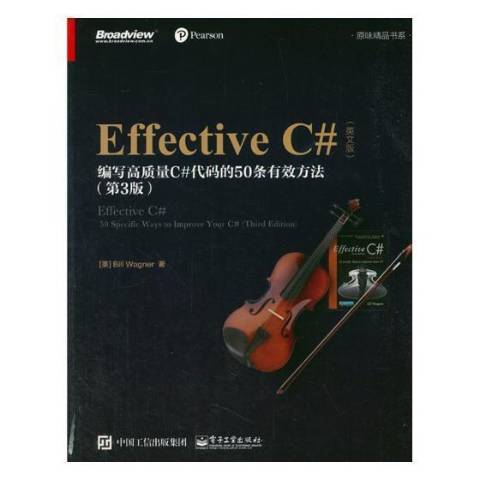《Effective C#:編寫高質量C#代碼的50條有效方法》是2018年電子工業出版社出版的圖書,作者是(美)Bill Wagner。
基本介紹
- 中文名:Effective C#:編寫高質量C#代碼的50條有效方法
- 作者:(美)Bill Wagner
- 出版社:電子工業出版社
- 出版時間:2018年
- 頁數:284 頁
- 定價:89 元
- 開本:16 開
- 裝幀:平裝-膠訂
- ISBN:9787121342653
內容簡介,圖書目錄,作者簡介,
內容簡介
本書的作者,也是.NET專家Bill Wanger給出我們50條利用C#優點以及特性來寫出健壯的,高效的,易於維護的代碼的高效法則。同時,本書也反映出了C#語言愈發高級的特性以及關於它的開發社區。本書同時也給出了大量新穎的方法讓你能夠寫出高效可靠的代碼。*的第三版囊括了一些泛型和一些其他的語言集成查詢(LINQ),還包括了對異常高級實踐這一新的章節。
圖書目錄
Chapter 1 C# Language Idioms .................................................................. 1
Item 1: Prefer Implicitly Typed Local Variables ........................................................... 1
Item 2: Prefer readonly to const ..................................................................................... 7
Item 3: Prefer the is or as Operators to Casts ............................................................... 12
Item 4: Replace string.Format() with Interpolated Strings ........................................... 19
Item 5: Prefer FormattableString for Culture-Specific Strings .................................... 23
Item 6: Avoid String-ly Typed APIs ............................................................................ 26
Item 7: Express Callbacks with Delegates ................................................................... 28
Item 8: Use the Null Conditional Operator for Event Invocations ............................... 31
Item 9: Minimize Boxing and Unboxing ..................................................................... 34
Item 10: Use the new Modifier Only to React to Base Class Updates ......................... 38
Chapter 2 .NET Resource Management .................................................. 43
Item 11: Understand .NET Resource Management ...................................................... 43
Item 12: Prefer Member Initializers to Assignment Statements ................................... 48
Item 13: Use Proper Initialization for Static Class Members ....................................... 51
Item 14: Minimize Duplicate Initialization Logic ........................................................ 53
Item 15: Avoid Creating Unnecessary Objects ............................................................ 61
Item 16: Never Call Virtual Functions in Constructors ................................................ 65
Item 17: Implement the Standard Dispose Pattern ....................................................... 68
Chapter 3 Working with Generics ........................................................... 77
Item 18: Always Define Constraints That Are Minimal and Sufficient ....................... 79
Item 19: Specialize Generic Algorithms Using Runtime Type Checking .................... 85
Item 20: Implement Ordering Relations with IComparable<T> and IComparer<T> .. 92
Item 21: Always Create Generic Classes That Support Disposable Type Parameters . 98
Item 22: Support Generic Covariance and Contravariance ........................................ 101
Item 23: Use Delegates to Define Method Constraints on Type Parameters ............. 107
Item 24: Do Not Create Generic Specialization on Base Classes or Interfaces .......... 112
Item 25: Prefer Generic Methods Unless Type Parameters Are Instance Fields ....... 116
Item 26: Implement Classic Interfaces in Addition to Generic Interfaces ................. 120
Item 27: Augment Minimal Interface Contracts with Extension Methods ................ 126
Item 28: Consider Enhancing Constructed Types with Extension Methods .............. 130
Chapter 4 Working with LINQ .............................................................. 133
Item 29: Prefer Iterator Methods to Returning Collections ........................................ 133
Item 30: Prefer Query Syntax to Loops ...................................................................... 139
Item 31: Create Composable APIs for Sequences ...................................................... 144
Item 32: Decouple Iterations from Actions, Predicates, and Functions ..................... 151
Item 33: Generate Sequence Items as Requested ....................................................... 154
Item 34: Loosen Coupling by Using Function Parameters......................................... 157
Item 35: Never Overload Extension Methods ............................................................ 163
Item 36: Understand How Query Expressions Map to Method Calls ........................ 167
Item 37: Prefer Lazy Evaluation to Eager Evaluation in Queries .............................. 179
Item 38: Prefer Lambda Expressions to Methods ...................................................... 184
Item 39: Avoid Throwing Exceptions in Functions and Actions ............................... 188
Item 40: Distinguish Early from Deferred Execution ................................................ 191
Item 41: Avoid Capturing Expensive Resources ........................................................ 195
Item 42: Distinguish between IEnumerable and IQueryable Data Sources ............... 208
Item 43: Use Single() and First() to Enforce Semantic Expectations on Queries ...... 212
Item 44: Avoid Modifying Bound Variables .............................................................. 215
Chapter 5 Exception Practices ................................................................ 221
Item 45: Use Exceptions to Report Method Contract Failures ................................... 221
Item 46: Utilize using and try/finally for Resource Cleanup...................................... 225
Item 47: Create Complete Application-Specific Exception Classes .......................... 232
Item 48: Prefer the Strong Exception Guarantee ........................................................ 237
Item 49: Prefer Exception Filters to catch and re-throw ............................................ 245
Item 50: Leverage Side Effects in Exception Filters .................................................. 249
Index .......................................................................................................... 253
作者簡介
Bill Wagner是世界上著名的C#開發者之一,是ECMA C#標準委員會的成員。他是Humanitarian Toolbox的主席,連續11年被授予Mcrosoft Regional Director和.NET MVP榮譽稱號,近剛剛被委派到.NET基礎顧問理事會任職。
影印版,無譯者……………

